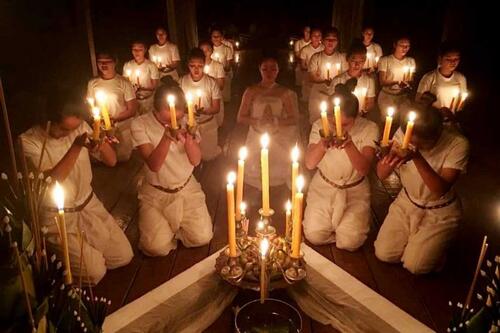“Sacred traditions at risk amid Covid” (The Phnom Penh Post)

“Sacred traditions at risk amid Covid” (The Phnom Penh Post)
This article in the Phnom Penh Post highlights the work of Ravynn Karet-Coxen, a Cambodian refugee who founded Sacred Dancers of Angkor, a vocational school that trains Cambodian youth in traditional dance as well as spiritual practices and a dance troupe that relies heavily on tourism. It explains the decrease in resources and performances by the troupe during the COVID-19 pandemic and appeals to readers to donate until the country opens up to tourists again.
When I first read this article, it struck me as incredibly strange. Though I deeply appreciate Karet-Coxen’s efforts to provide a livelihood and stability to Cambodian youth and their families through this dance program, the spirituality of the program seemed oddly nondescript and performative. The illustration of the spiritual elements seemed to be written for those unfamiliar Khmer spirituality. They are vaguely fanciful and even exoticised in their description — “they wear white for purity and they use mosquito nets because they Buong Soung [pray] for the malaria to go away. Everything we do involves symbolism.” It also treats Karet-Coxen’s work as almost this supernatural force that solely transformed communities out of poverty. The author writes, “As soon as they started the dance classes, it was like the storm clouds passed and the sun shone through. Less people were dying and the livestock were in better condition.”
I had sent this article to my parents to hear their thoughts on it, and it turns out that Ravynn Karet-Coxen is a distant relative of ours. While the article unsettled me, I was still surprised to hear my mother describe Karet-Coxen as “orientalist” and a “white savior,” even though Karet-Coxen is ethnically part Cambodian. I do, however, recognize these descriptors. It does seem that she exploits elements of Cambodian spiritual practices, using Khmer aesthetics to bait tourists. If these traditions are indeed “sacred,” it is odd to me that she emphasizes their consumption by foreigners. There are also some quotes that seem to almost fetishize the poverty and cultural deprivation of these dance students, such as when Karet-Coxen says, “There was still no hope in their hearts or light in their eyes,” which is followed by a description of her efforts to introduce these people to Cambodian cultural traditions. What irritates me the most is that right before quoting Karet-Coxen requesting donations, the article quotes her saying, “This is my last thing. I’m not taking any more responsibility if [the Cambodian people] don’t take responsibility.”
I think it’s important to situate this article within the historical context of the Phnom Penh Post, the publication it appears in. When it was founded in 1992 by Michael Hayes and Katherine O’Keefe, it was internationally respected for its vigorous journalism. A few years ago, the Post was bought by a Malaysian businessman with strong ties to Hun Sen, and is now allowed to run under the approved management of the government. Locals don’t really read the Post. It seems that it is mostly consumed by foreign expatriates living in Cambodia, and Cambodian expatriates living overseas. This is the audience Karet-Coxen is appealing to — wealthier individuals who are able to support Cambodia’s tourist industry, and don’t necessarily prioritize the preservation and protection of authentic Cambodian cultural and spiritual traditions over the promotion of a consumable, romanticized image of Cambodia.